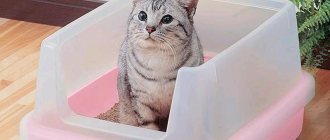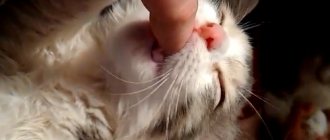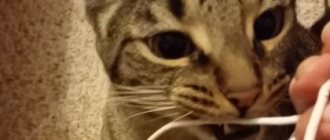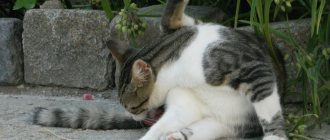Many cat owners have probably watched their pet bury food in her bowl more than once. This picture looks very funny, but not every owner thinks so - for some, this behavior of the pet seems abnormal. It is especially strange to see how an animal hides leftover food in the most secluded corners of the apartment.
There are at least two main reasons why cats bury food: innate instincts or acquired habits.
Saving food for later
A cat buries a bowl of food because that’s what its relatives did many years ago. This behavior is due to the desire to preserve supplies for the future. Outside the house, animals get their own food - for this they have to hunt, but not every hunt ends fruitfully. To avoid starvation, animals save food by burying it.
It is difficult to fight the instinct, and if the owners do not find other reasons for burying, they leave everything as it is.
Unpleasant smell of stale food
You can easily notice that cats love cleanliness. They are unlikely to eat food that they do not like. Therefore, if the pet sniffed the bowl and began to bury it, we can talk about the poor quality of the food or its spoilage. The cat does not have the opportunity to throw away its food, so there is nothing left to do but bury it deeper.
Particularly capricious cats bury food that has been left in the air for only 2-3 hours. It is fundamentally important for such animals that they are given only fresh food - the owners may have to feed the shrew several times a day and little by little.
Competition with other animals
One of the reasons why cats may bury food is due to competition with other cats or dogs that share their territory.
In this case, there are two options why the cat buries a bowl of food:
- This can happen if the cat does not live at home alone, that is, several cats or other pets live in one apartment. The instinct of competition awakens in the animal, and it buries a bowl of leftover food so that others do not encroach on its food.
- The reason may be feeding the cat outside (for example, if the owners live in a private house and prefer to place the bowl of food outside the house). In this case, the cat senses that there may be other cats nearby, and instinctively buries the leftover food so that its smell does not attract strangers.
It is worth setting the number of bowls according to the number of “heads”. In some cases, it will be necessary to delineate the place for food - if serious battles break out because of it.
Why does a cat bury his food bowl?
There is nothing serious to look for in such behavior. With such actions, the animal provides itself with confidence in the future. But sometimes cats can be observed burying not only the remains of uneaten food, but also food that has not yet been eaten.
Instincts and reflexes
A cat is a predator. It contains many reflexes and instincts on which the life of any animal is based. Instincts are a form of behavior determined at the genetic level under the influence of biological needs.
Instincts force the animal to act as subconscious beliefs tell them. Domestic cats are no exception. Sometimes kittens bury food without even understanding the reason for such actions. They simply follow their instincts. Most often this happens in spring or autumn. Felinologists explain this behavior by a lack of vitamins.
Reflexes are stereotypical behavior that occurs with the participation of the central nervous system and is reflected in adaptation to living conditions. They are inherited by cats.
Three main groups of instincts can be distinguished:
- ensuring the vital functions of the body necessary for its normal functioning (food, sleep, etc.);
- helping to contact other animals (sexual and parental instinct);
- instincts of exploration and play.
According to experts, domesticated cats exhibit the instincts of their ancestors. The main one is survival . The cat is trying to stock up by burying food. She hides food from potential competitors so that her hunger can be satisfied at any time. This behavior is more typical of those pets that have been wandering and starving.
Burying food may indicate the animal's desire to ensure its safety. Under natural conditions, cats bury food in order to hide traces of their presence. Such actions make it possible to successfully hunt without being detected by potential prey or competitors.
ATTENTION! Burying food does not always mean that the animal is full. If this behavior is observed near an empty bowl, then the cat is hungry and is looking for previously hidden food.
Habit
In addition to instincts, cats may exhibit their life experience, which is not entirely clear to its owner. An animal may accidentally spill water next to food. To remove the puddle, she begins to scratch with her paws. In this case, the cat’s need for cleanliness manifests itself.
Perhaps your pet doesn’t like where her food dishes are. Then she will bury it without even touching it. The cat does not feel safe and is uncomfortable. Extraneous noise, odors, or inappropriate temperatures may cause anxiety. You need to try to understand what the cat doesn’t like and make adjustments.
ATTENTION! Also, after the birth of kittens, the female can hide food in the most unusual places.
Features of behavior
If a kitten is taken from the street, then you need to be prepared for unusual behavior. Over time, these oddities disappear. It is worth keeping in mind that while living on the street, the animal experienced severe psychological shock. This also applies to adult cats.
It is more difficult for them to get rid of this habit, since memories of hunger and malnutrition remain in their memory for a long time. Therefore, having eaten, they try to hide food “for a rainy day.”
In some cats, specific behavior is manifested due to the characteristics of the breed, for example, the cat is overly clean.
Malnutrition
Here we can highlight several aspects related to why the cat does not finish eating and buries the food, leaving it for later.
Perhaps the cat has not been with you since childhood and has lived in poor conditions for some time. Cats that are accustomed to hunger will intentionally leave some of their food behind and try to bury it so that when times get tough, they have a supply that can be found and eaten. The habit is eliminated over the years if the cat lives in satiety and abundance.
If the cat really liked the food or the owner decided to pamper him with something unusual, he may try to hide some of the treats in order to return to the delicacy again later. It is more difficult to deal with such cunning - as a rule, this is part of the pet’s character.
Stress
Like many people, cats experience a lot of stress due to external factors. When an animal experiences anxiety, its appetite decreases and its health worsens. In this case, the cat may try to save food for a time when he feels better and wants to snack. Stress factors can be moving, the arrival of a new pet or small child in the house, as well as rearranging, changing the tray, filler or bowl.
If a cat buries food for no apparent reason, the owner needs to determine what this means as soon as possible so as not to miss the stressful or painful state of his pet.
Reflexes and instincts
Biologists call a reflex a certain stereotypical action performed with the participation of the central nervous system and reflecting a deterministic reaction of adaptation to the conditions of existence. Unconditioned reflexes are inherited and are inherent to the entire species. Cats, like people, reflexively make breathing, chewing, and swallowing movements. In the same way, cats protect themselves, protect their offspring, and reproduce. The movements of the paws, simulating digging, are also caused by a reflex.
Instincts are genetically determined forms of behavior carried out under the influence of biological needs. The role of instinct in obtaining the desired result when performing certain actions. It reflects the useful experience of previous generations.
The basic instinct of all living beings is survival. And it is impossible to live without food, so the cat strives to stock up. She knows that she lives in a world of struggle for survival and hides food from potential competitors for a place in a biological niche so that her hunger can be satisfied at any time. This behavior is especially characteristic of cats that have experienced a period of hunger, for example, those that have wandered.
The implementation of the survival instinct by burying food may also indicate a desire to ensure one’s own safety. In nature, cats bury not only excrement, but also leftover food in order to eliminate traces of their presence. This allows you to successfully hunt without revealing your presence to either competitors or potential prey.
Digging on the floor may also indicate that the animal has not had enough to eat. If this happens near an empty bowl, the owner needs to pay attention to this. A cat can not only bury, but also try to dig up previously hidden food (and she remembers that she buried it in this place).
Another reason for burying a bowl is that the animal does not like the food offered. It is of poor quality from its point of view, and it treats it in the same way as with excrement, it disposes of it.
Inconvenient bowl location
If your cat buries food, you can assume that this is due to an inconvenient or incorrectly placed bowl. In this case, the cat points out to the owner what does not suit her. Perhaps the cat doesn’t like the smell of the place where it eats, the sounds made by household appliances, or everything is connected with drafts - if the bowl is close to the windows or the front door.
Try moving the plate the cat is eating from. Perhaps after the first or second rearrangement she will stop burying food.
Why do cats bury food?
Many owners notice that after eating, their furry pets try to bury their bowls - they scratch the floor around them. Some people find this behavior funny, while others think that cats are being mischievous or they simply don’t like the food. In fact, there are many reasons that can explain this behavior.
Historically, absolutely all cats bury their food. People don't notice differences in the smells of cat food. However, cats recognize them perfectly. This happens thanks to pheromones - unique chemical markers of odors.
Inconvenient bowl
No matter how strange it may sound, comfort is also important to animals. This also includes the dishes from which the pet eats food. If it is inconvenient for him to eat from the option offered by the owner, then most likely the food in the bowl will be buried until new utensils are purchased.
You need to choose a not very deep cup according to the size of the animal. The preferred material is metal or ceramic. Plastic emits a slight odor, and the cat will immediately refuse it. An automatic feeder can be a good purchase.
Cat disease
Poor health can also cause a cat to bury food, as if storing it for later. Just like people, cats lose their appetite when they are sick. But due to instincts, animals tend to hide food for better times in order to finish it later - and so that the smell does not attract strangers to the bowl.
It is worth paying attention to the cat's health if she begins to malnourish and bury food, while she has signs of decreased activity and other symptoms of illness (fever, discharge from the nose or eyes, problems with the coat). If the alarming condition persists, you should take your pet to the veterinarian as soon as possible.
Cat burying an empty bowl
The reasons why Murka buries its paw in an empty bowl and feeding area may be that:
- The animal has not eaten. The lack of food stimulates the cat to look for previously hidden supplies, and therefore it will imitate “digging” near the place where food usually occurs.
- The cat's dining room is located incorrectly from the point of view of the pet itself. For cats, order in their personal territory is extremely important, so the dining room, sleeping area and toilet should be located in different parts of the house.
- The cat expresses its negative attitude towards a dirty bowl, because hygiene and cleanliness are a “fad” of cat psychology.
- Water is spilled near the feeder or there is a faulty, constantly flowing tap. Cats do not like water, so they experience irritation and nervousness when they perceive unpleasant signals.
How to wean a cat from the habit of burying
If the owner managed to find out why the cat buries the food bowl with its paw, and this is not associated with illness, it is necessary to begin the process of weaning the cat from the habit. A hungry animal should be fed heavily, but certainly with fresh food. If your cat doesn’t like a certain type of food, you should switch to a new product.
Each pet should have its own cup - then they will not start competing with each other. All plates should be placed in a calm, warm and comfortable place for pets.
When a cat buries food, it not only makes annoying noises, but can also damage the flooring - many owners don't like this. In this case, it is necessary to trim the animal’s claws or acquire special anti-scratch guards, since the weaning process may take a long time.
If you can’t fight the burying instinct, place a mat under the cat’s bowl that protects the floor from his claws and absorbs the noise of scratching.
The cat digs and eats flowers
Another harmful and unpleasant habit of animals is when they eat, dig up or drop indoor plants. If you want to stop your cat from digging flowers, just put them in a place that is inaccessible to her, maybe on a shelf nailed to the wall or something similar.
7. Why does a cat, when burying the “results” of its life activity, dig outside the box and not inside? A mother cat purrs to her kittens to show that she is nearby. The kittens respond in kind, indicating that everything is fine. 22. Why do cats spend so much time licking their fur? 25. Why can a cat, if you pet it for a long time, suddenly scratch or bite? When a cat catches prey, it squats several times.
They also splash the water out of the bowl, a lot! Yes, that’s how we eat canned food too))) Probably so that in life they won’t guess that he was waiting for her and generally approves))) He’ll bury her, leave, but within five minutes he’ll come running to crack.
Many owners complain that their cat meows often. It also often happens that cats wake up their owners in the morning with their screams, demanding to feed them, and this is also a developed bad habit! It is better to wait, even if he meows very loudly, and feed the animal later, for example, before going to work.
Often, owners of domestic cats notice such an interesting feature of their behavior: before eating or after they have eaten, the animals scratch the floor next to the bowl with their front paws, as if they are burying something.
So the pet, on a subconscious level, had the idea that the remaining treat could be hidden in order to get it later and eat it in peace. Cats are also excellent at distinguishing odors, and if food does not smell very aromatic or is completely strange, the cat will also find it tasteless.
Cats walk on their own, they are mysterious, unpredictable, sometimes they are simply unbearable, but thousands of people literally idolize these four-legged animals and try to understand them. If your cat buries its food bowl as a toilet, there is no need to worry or make scary guesses.











